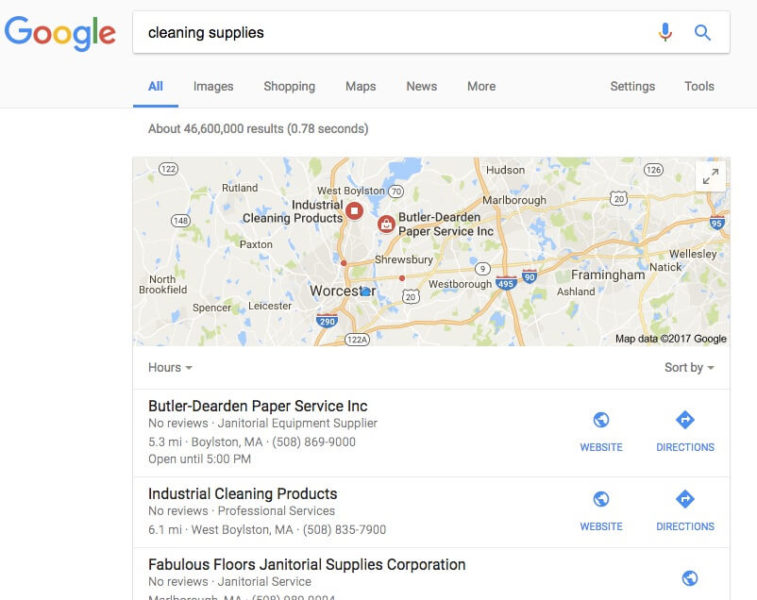Do organic keyword rankings matter anymore?
With all the ways search engine results pages have evolved over the years, columnist Julian Connors explores the question of whether SEO is still a wise investment.
High keyword rankings are the most sought-after achievement in the world of search engine optimization (SEO). Small businesses and brands alike strive to obtain the first organic listing in search results because of the lucrative traffic and lead opportunities that are associated with this position.
But with the evolution of paid advertising and expansion of universal search, as well as Google’s continuous efforts to provide consumers with content that resolves their demands directly in search results, the opportunities attached to traditional keyword rankings are diminishing at an alarming rate.
In today’s search landscape, SEOs and digital marketing specialists have to consider whether it’s worth the amount of time and resources it takes to achieve premier organic rankings, considering the click-through rates (CTR) associated with organic rankings that are positioned under PLAs, local results and other forms of content.
Keyword rankings aren’t the only way to connect to online customers
There was a time not too long ago when achieving the first organic position on Google was one of the only ways to attract new online customers to a website without having to invest in paid advertising or e-mail marketing.
Ten years ago, the world was just warming up to the power of social media and its influence on the World Wide Web. Back then, most consumers were just starting to become aware of YouTube’s marketing power, Facebook was starting to open itself up to audiences outside of college students, and blogging was just starting to become mainstream, as everyone from CNN to Mashable began investing in new, niche content in the form of top lists and how-to articles.
Because of this boom in social connectivity, businesses and brands suddenly had access to free channels that were viable for attracting new business to their websites.
In 2017, there are thousands of social media platforms to join, millions of user-generated content forums, and approximately 320 million blogs around the world (up from 260 million in 2015).
Today, it’s rare to find a local business or brand that isn’t connected to an established directory host like Yelp or TripAdvisor, whose own online credibility is so impressive that it allows their less authoritative clients to rank well within organic results.
New niche environments allow businesses to focus on conversions, not site traffic
When companies and brands were only able to connect with new customers through organic rankings, it made sense to invest a significant amount of time and resources to build thousands of links and cram keywords into a particular website to increase visibility.
Now that there are thousands of free channels that cater to niche demographics with specific interests, it’s easier than ever for brands to identify relevant environments that can be targeted for conversions. The online landscape of today allows businesses and brands to focus on maximizing qualified conversions, rather than trying to gain as much traffic as possible with the hopes that a particular portion is going to convert into a sale.
One of the problems with keyword rankings is that any consumer can click through to a website and immediately leave because the title tag and meta description didn’t align with the content of its associated landing page. Ranking first on Google does not mean that every visitor is going to turn into a paying customer because of how limited keywords are for understanding granular details associated with online consumers.
Social media and other niche online communities trump the value of keyword rankings because they serve as natural environments for like-minded users with specific interests to hang out in, consuming new forms of hyper-focused content that keep them returning.
Because of how easy it is today for businesses to build strong social media followings, basic engagement can improve everything from brand awareness and online reputation to traffic and revenue. Keyword rankings lack the power of social media because they are not proactive means of engagement, and they don’t necessarily connect brands with the type of qualified traffic that exists and is readily available in communities like Reddit or Instagram.
Google is crushing the desire to achieve premier keyword rankings
It’s always important to keep in mind that Google is a business; they are not just a convenient means for finding information or purchasing products.
Recognizing that Google is a business that competes in a free market where consumers have options, it is their goal to become an all-inclusive destination that provides an experience that is so fulfilling, it keeps consumers returning to their search engine.
Local results bury traditional rankings
Google’s focus on providing content that displays local options for consumers to consider has diminished the power of premier keyword rankings for some industries which were appearing at the very top of search listings, only to now be buried beneath the fold.
Sponsored ads blend with organic results
Product listing ads and the inclusion of a fourth paid search ad for certain highly commercial queries have pushed organic results down the page even further, which significantly reduces the CTR of each organic position.
Considering that the first organic position on Google commanded a 31 percent CTR in 2014 and the fourth position garnered a 7 percent CTR, it’s clear that today’s blended search results pages may render top organic results that are not nearly as powerful for driving site traffic as they used to be.
Free products, direct answers & featured snippets diminish consumers’ need to engage in site content
The ability for Google to resolve consumer demands without having to enter a particular website continues to increase, as there are more free products, definitions and featured snippets appearing every day.
Informational websites that depend on attracting a tremendous amount of traffic in order to maintain their ad rates are at the mercy of featured snippets, which provide users with immediate answers whenever they search with specific questions. Featured snippets also push traditional rankings below the fold, which may negatively affect CTR.
Why keyword rankings are still important for success
Although all of the points made against the effort it takes to build premier keyword rankings are valid, it is still important for businesses and brands to actively strive for premier organic rankings.
Despite diminished visibility and CTR within particular types of search listings, organic rankings remain one of the most powerful entrances for brands to connect with new customers.
SEOs and digital marketing specialists can maximize their traffic and conversion opportunities through keyword rankings by creating quality content around niche concepts and phrases that their target audience uses or searches for. This allows brands to increase their monthly traffic and receive qualified conversions based on the type of consumer research that guides their content development efforts.
Like anything else with digital marketing, the formula for achieving success is to maintain a campaign that combines social media, paid advertising, SEO and other relevant channels.
Opinions expressed in this article are those of the guest author and not necessarily Search Engine Land. Staff authors are listed here.
Related stories
New on Search Engine Land



